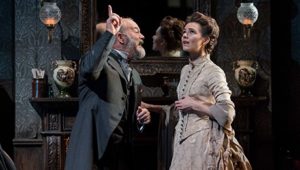
 (4 / 5)
(4 / 5)
Joseph and the Amazing Technicolour Dreamcoat is a familiar story taken from the bible. It is the tale of a younger son, of a favoured wife, being elevated by his doting father and put above his eleven brothers. The brothers, already jealous of their younger brother finally are pushed to action and when their father Jacob gives Joseph the gift of a wonderful new coat and their outrage is complete. The brothers plot to kill Joseph and thus dispose of the problem. However, they fail to complete their plan as they cannot bring themselves to actually commit murder. The answer to this dilemma comes in the form of a travelling slave trader from Egypt and they decide to sell Joseph into slavery. On returning home the brothers tell their father, Jacob, that his beloved son has met with an accident and has been killed by a wild beast and they show him the bloody torn coat as evidence. Meanwhile Joseph has been sold into the household of an Egyptian noble where he works hard and becomes a trusted slave.
However, he catches the eye of the Noble’s wife and is soon accused of wrongdoing. His master has him thrown into prison from which there seems to be no escape. In prison Joseph becomes know for his gift of being able to know the meanings of dreams and this quickly comes to the notice of Pharaoh through his butler, a man who has first hand experience of Joseph’s ability. Joseph is summonsed to Pharaoh’s palace where he is given the task of explaining the meaning of Pharaoh’s dreams. Clearly nervous, Joseph tells Pharaoh what his recurring dream means. Egypt will have seven years of bumper harvests followed by years of famine. When the dream comes to pass Pharaoh places his trust in Joseph and puts him in high office and he becomes a trusted Egyptian. During the famine the people are starving and Joseph’s brothers come to Egypt to try to secure food for their family. The last person they expect to see is Joseph and at first they do not recognise him. Joseph doesn’t make the reunion easy but the family of brothers are eventually reconciled and reunited with Joseph’s parents, so there is a happy ending.

Joseph is a roller coaster ride for the theatre goer of any age. From the moment to curtain rises the production is a vibrant mix of colour and sound to stimulate the senses. From the pens of Tim Rice and Andrew Lloyd Webber, Joseph is a triumph. They have successfully taken a biblical tale and transformed it into a secular story that bridges the gaps of time and its message has as much meaning now as it had when it was written. Its appeal spans the generations and this was evident by the diversity of the audience what ever their age, gender or religious belief.

Joe McEdderry, gave a convincing and captivating performance as Joseph, his energy on stage is infectious and his smile and demeanour grabs the audience from curtain up right to the last number when he and the cast received a richly deserved standing ovation.

Henry Metcalfe’s choreography was creative and inspiring with many unexpected twists in the tale and lead us to expect the unexpected on several occasions. The costume design was creative and complimented the performances of the actors against a backdrop of scenery which was uncomplicated and did not distract from the telling of the story which in parts had distinctly modern twists and turns and some unexpected characterisations.
The Narrator, Lucy Kay, linked the scenes and lead the viewer on an unforgettable journey of characters, places and far away lands. With the added voices of the children it is a magical experience in which the audience is absorbed into playing an active role and ends in a well deserved standing ovation.
https://www.wmc.org.uk/Productions/2017-2018/DonaldGordonTheatre/Joseph17/
Tag Archives: Jane Bissett
Review Gaslight, New Theatre, Cardiff by Jane Bissett

 (4 / 5)
(4 / 5)
Gaslight is a psychological thriller and focuses on the behaviour and sanity of Mrs Bella Manningham. Jack Manningham, is a subtle and clever manipulator who is controlling his wife by questioning her mental stability Indeed it is he who has engineered her current fragile state of mind and preys on her insecurities using the knowledge that she is haunted by the facts that her own mother had what was termed a ‘weakness of mind’ and ended her days in the ‘mad house’. It is clear from the opening scene that she is a woman who is living with a roller coster of emotions, her behaviour is constantly being questioned by her husband.

Whilst most evenings Jack Manningham is out pursuing his own ‘interests’ Bella is left alone in the house. Lonely and fearful and with items mysteriously being removed for which there is no explanation, she believes that there is someone else in the house. The dimming of the gaslight and footsteps from the rooms above at the top of the house, which her husband insists is not to be entered by any of the household and the doors remain locked, only serves to heighten her fear and anxiety.
Bella’s eventual salvation comes in the form of a detective, Rough, who has an ongoing interest in both Bella’s husband and the house in which they now live. With the aid of Bella’s maid, Elizabeth, Rough visits the house to investigate the unexplained happenings, discover the truth and save Bella from both insanity and her husband.

Rupert Young’s portrayal of Jack Manningham is skilful and disturbing. From the moment we first see him with his wife, the hairs on the back of the neck stand up. Jack clearly has an agenda in which his wife no longer serves a useful purpose so he plans to be rid of her. Young’s skill and ability to transform from a caring and compassionate husband to a calculating and manipulating bully make for uncomfortable viewing as he plays on his wife’s insecurities and her fear for her own state of mind.
As a cad and a rouge Young’s performance was confident and calculating. His stage presence and arrogant posture made his character believable and that as a man living in a male dominated society he could do what ever he wanted without reproach.
In contrast, Keith Allen, the man who we remember most in the mad and bad roles gave us a wonderful performance as the seasoned detective Rough. He brought the character alive from the moment he sets foot onto the stage, with a commanding confidence that makes the audience warm to Rough immediately. His delivery of Rough’s humour engaged the audience and his on-stage presence brought the play to life. During a scene when Jack Manningham return home early and unexpected there is almost a hint of a farce as Rough hides in a dressing room and just for a few moments we almost forget the dark subject of the play. Allen outstanding characterisation gives us a view into the compassionate and understanding side of Rough’s character as he endeavours to uphold justice and save Bella from a situation in which she has no control.
The play was staged on a single set, the drawing room of the house, which was designed and lit beautifully creating a style of Victorian elegance which was in keeping with story telling. There was a particular attention to the lighting as the name of the play would suggest, Gaslight, and these were given by two elegant lights either side of a large over mantle mirror which also gave an additional perspective during the scenes where Jack Manningham was addressing his wife as his reflection could be clearly seen although his back was to the audience. The atmosphere of the set was also enhanced by the use of lighting outside the room, which we were to believe was from the street outside, casting shadows of the players against the back drop of the drawing room doors, and also from what has to be the most realistic fire I have ever seen on a stage.
The costumes were as expected of the period in which the play was set and gave an overall feel of authenticity and drama which followed throughout the performance.
The play is a tale of crime and domestic abuse. Jack Manningham believes in ultimate power and control over his wife. His behaviour is now recognised by society and the law as what is now referred to as ‘coercive control’. When Rough suggests to Bella that her husband is not all he seems and is creating the problems she now faces, she is resistant. Clearly a woman of low self-esteem she clings to what she knows, her role as the loyal wife to a man who loves and protects her rather that being able to accept that truth of the situation unfolding around her. Her need to be loved blinds her to the realisation of what her husband is capable until the end. It is only the maid, Elizabeth, who sees Jack Manningham for who he really is and it is her intervention that draws the story out to a successful conclusion.
